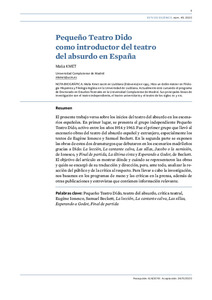Pequeño Teatro Dido as Introducer of Theatre of the Absurd in Spain
Metadata
Show full item record
Estudis escènics: quaderns de l'Institut del Teatre. 2020, Núm. 45
Document typeArticle
Abstract
<p>This article focuses on the beginnings of the Theatre of the Absurd in Spanish theatres. It introduces the independent group Pequeño Teatro Dido, which was active between the years 1954 and 1963. This was the first group to perform Spanish and foreign Theatre of the Absurd plays, especially by Eugène Ionesco and Samuel Beckett. In the second part of the article we present the plays by those two playwrights that debuted on the stages of Madrid thanks to Dido: <em>The Lesson</em>, <em>The Bald Soprano</em>, <em>The Chairs </em>and <em>Jack, or The Submission </em>by Ionesco and <em>Endgame</em>, <em>Krapp’s Last Tape </em>and <em>Waiting for Godot </em>by Beckett. The objective of this article is to show where and when these plays were staged and mention their translators and directors, but especially to analyse the reaction of the audience and critics. The research is based on programmes and reviews in the newspapers together with other publications and interviews that contain relevant information. </p> <p>El presente trabajo versa sobre los inicios del teatro del absurdo en los escenarios españoles. En primer lugar, se presenta el grupo independiente Pequeño Teatro Dido, activo entre los años 1954 y 1963. Fue el primer grupo que llevó al escenario obras del teatro del absurdo español y extranjero, especialmente los textos de Eugène Ionesco y Samuel Beckett. En la segunda parte se exponen las obras de estos dos dramaturgos que debutaron en los escenarios madrileños gracias a Dido: <em>La lección</em>, <em>La cantante calva</em>, <em>Las sillas</em>, <em>Jacobo o la sumisión</em>, de Ionesco, y <em>Final de partida</em>, <em>La última cinta </em>y <em>Esperando a Godot</em>, de Beckett. El objetivo del artículo es mostrar dónde y cuándo se representaron las obras y quién se encargó de su traducción y dirección, pero, ante todo, analizar la reacción del público y de la crítica al respecto. Para llevar a cabo la investigación, nos basamos en los programas de mano y las críticas en la prensa, además de otras publicaciones y entrevistas que contienen información relevante.</p>
Access conditionsOpen Access
ISSN2385-362X
,
0212-3819
Collections
- 2020: Núm.: 45 [11]


